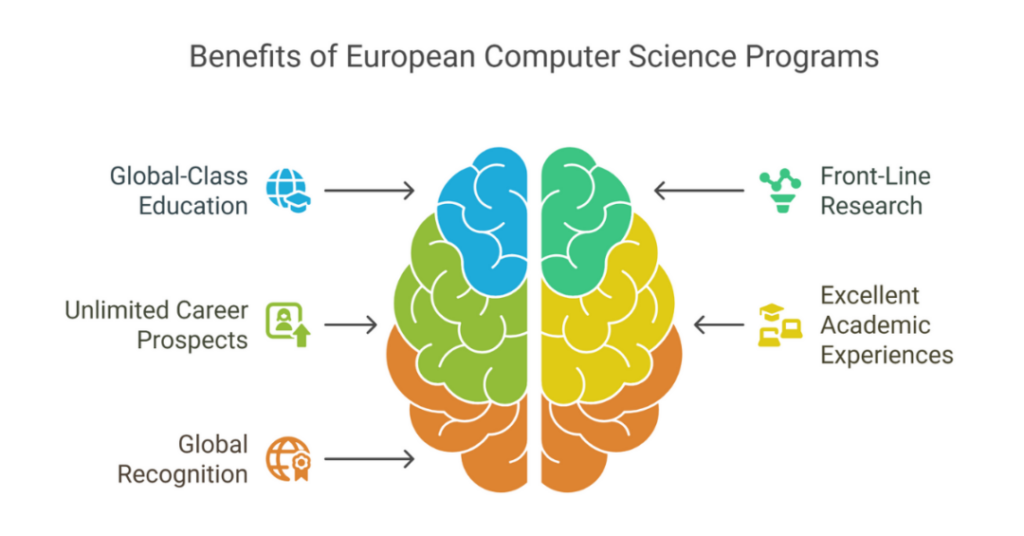9 July 2025
4 minutes read
5 Best Computer Science Masters Programs Europe 2025: Ranking the Top Universities in Europe for Indian Students

Key Takeaways
- Best computer science masters programs Europe offer top-tier specializations in AI, big data, and intelligent systems at globally ranked universities.
- Best computer science masters programs Europe ensure world-class education with research-focused curricula and strong career prospects.
- Best computer science masters programs Europe combine academic excellence, affordability, and scholarship options like Erasmus Mundus.
Selecting a master’s in computer science program in Europe provides foreign students with access to global-class education, front-line research and unlimited career prospects.
Leading universities in Europe provide excellent academic experiences in science and engineering, providing students with the opportunity to search for the best computer science courses with global recognition.
Why Study Abroad in the Best Universities Around the World?
Did you know that 25 of the world’s best 100 universities are located in Europe? That makes studying in Europe one of the best decisions for students seeking DAS or artificial intelligence. The international exposure to different thoughts, brilliant professors, and actual industry contacts makes it worthwhile.
MSc in Computer Science and Information Systems at Leading Universities for Computer Science: An Overview
ETH-Zurich is consistently ranked among the world’s top 10 computer science universities! Computer science and information-systems programmes in Europe cover fields such as cybersecurity, intelligent systems, and human-computer interaction.
What are the Specializations and Research Opportunities These Universities Offer?
From artificial intelligence to big data, European universities provide a smorgasbord of specializations in computer science and software-engineering. These master’s programs in Europe equip students with hands-on skills and international networking opportunities both within academia and industry.
5 Best Computer Science Masters Programs Europe in 2025
In 2025, overseas students seeking a master’s in computer science have amazing programs to select from.

These institutes have research-focused and part-time programs specially designed for professionals as well as fresh graduates:
- ETH Zurich: Strong in intelligent systems and algorithm development.
- Delft University of Technology: Known for human-computer interaction and big data.
- Imperial College London: Offers cybersecurity and software engineering specializations.
- KTH Royal Institute of Technology: Focus on artificial-intelligence and cutting-edge computing.
- RWTH Aachen: Research-intensive programme with links to German tech giants.
| University | Country | Popular Specializations | Average Tuition (per year) |
|---|---|---|---|
| ETH Zurich | Switzerland | Intelligent Systems, Algorithm | €1,200 |
| Delft University of Technology | Netherlands | Big Data, Human-Computer Interaction | €18,750 |
| Imperial College London | UK | Cybersecurity, Software Engg. | £32,000 |
| KTH Royal Institute of Technology | Sweden | Artificial-Intelligence, Cloud Computing | €15,000 |
| RWTH Aachen | Germany | Machine-Learning, Data Science | €1,000 |
Ranking Top Universities for Engineering and Computer Science in Europe
Surprised? European universities lead the rankings in global engg. and computer science for a good reason. Their perfect combination of scholarship and practice makes them appealing places to pursue a degree in computer science.
1. University of Oxford
Offering one of the most demanding science and engg. programs, Oxford demands IELTS or TOEFL, GRE, an excellent letter of recommendation, a personal statement, and an academic resume.
2. University of Cambridge
Known for its focus on algorithms and artificial-intelligence, Cambridge seeks a solid statement of purpose, ACT/SAT scores, and references.
3. University of Edinburgh
Strong in cybersecurity and software systems. Requires GRE, and one professor’s letter of recommendation.
4. University of Zurich
Offers specializations in machine learning and information systems. TOEFL, resume, and a detailed statement of purpose.
5. Imperial College London
Their computer science programme ranks among the top 10 globally. Requires GMAT or GRE, IELTS, and a personal statement.
6. Technical University of Munich
A hub for robotics and human-computer interaction. Applications include a resume, GRE, and two academic references.
7. Delft University of Technology
Known for Artificial-Intelligence and intelligent systems. Requires TOEFL, resume, and personal statement.
8. University of Manchester
Offers excellent part-time options in data science. Requires statement of purpose, and academic references.
9. University of Liverpool
Focuses on real-world application of cybersecurity and big data. Needs GRE, IELTS/TOEFL and resume.
10. KTH Royal Institute of Technology
Ideal for machine learning specializations. Requires ACT or GRE, IELTS, and a detailed resume.
Erasmus Mundus Scholarship: All that You Need to Know
Erasmus Mundus covers tuition, travel, and living costs! International students enrolling in a master’s in computer science or information technology programme can apply with IELTS, GRE and a compelling personal statement.
Conclusion
Exploring the best computer science programs in Europe helps international students gain a research-oriented degree in computer science with global relevance.
These European universities offer diverse specializations, cutting-edge labs, and career opportunities that shape future leaders in academia and industry alike.
So, embark on your educational adventure with Ambitio and make the most of this enriching experience in the heart of Europe.
FAQs
What are the admission requirements for the best computer science masters programs Europe?
The best computer science masters programs Europe generally require a bachelor’s degree in a related field, IELTS/TOEFL, GRE, a personal statement, resume, and letters of recommendation.
Are scholarships available for the best computer science masters programs Europe?
Yes, many of the best computer science masters programs Europe offer scholarships like Erasmus Mundus that cover tuition, travel, and living expenses.
Which universities offer the best computer science masters programs Europe in artificial intelligence?
Top choices for the best computer science masters programs Europe with AI specializations include ETH Zurich, KTH Royal Institute of Technology, and Imperial College London.
Can international students apply for part-time options in the best computer science masters programs Europe?
Yes, part-time options are available in several of the best computer science masters programs Europe, especially in universities like RWTH Aachen and University of Manchester.
What is the typical duration of the best computer science masters programs Europe?
The best computer science masters programs Europe usually span 1 to 2 years, depending on the university and whether the program is full-time or part-time.
Do the best computer science masters programs Europe include real-world industry exposure?
Yes, many of the best computer science masters programs Europe incorporate internships, capstone projects, or research collaborations with top tech companies.
Can non-technical graduates enroll in the best computer science masters programs Europe?
Some of the best computer science masters programs Europe offer preparatory or conversion courses for students coming from non-technical academic backgrounds.

You can study at top universities worldwide!
Get expert tips and tricks to get into top universities with a free expert session.
Book Your Free 30-Minute Session Now! Book a call now




























